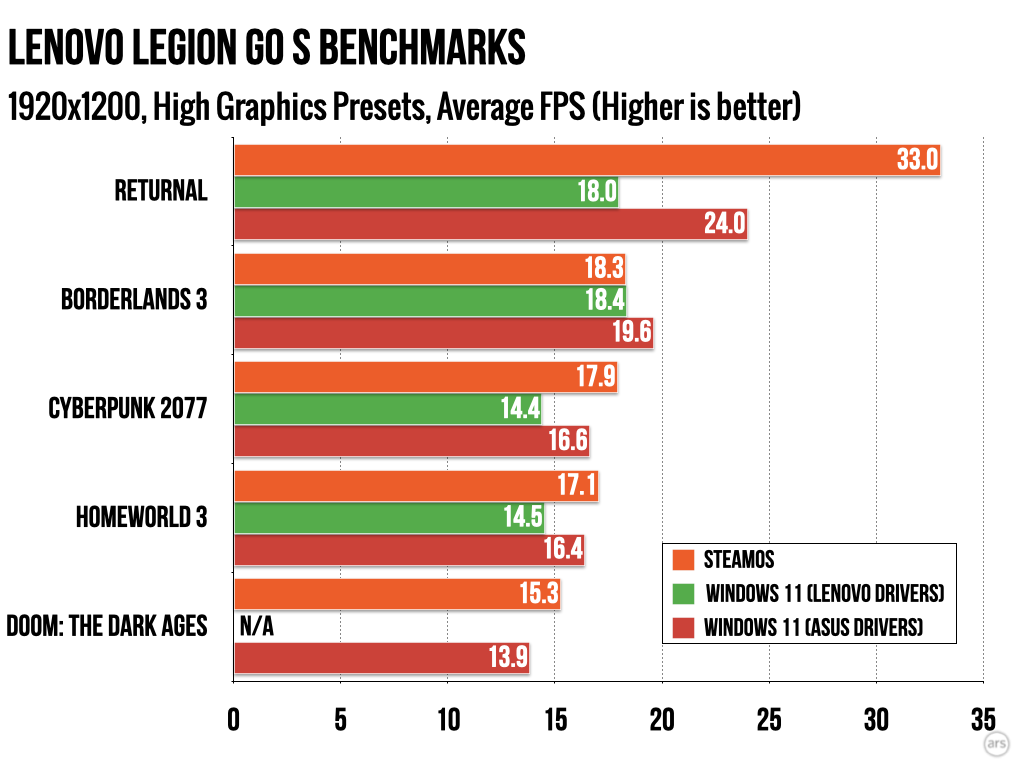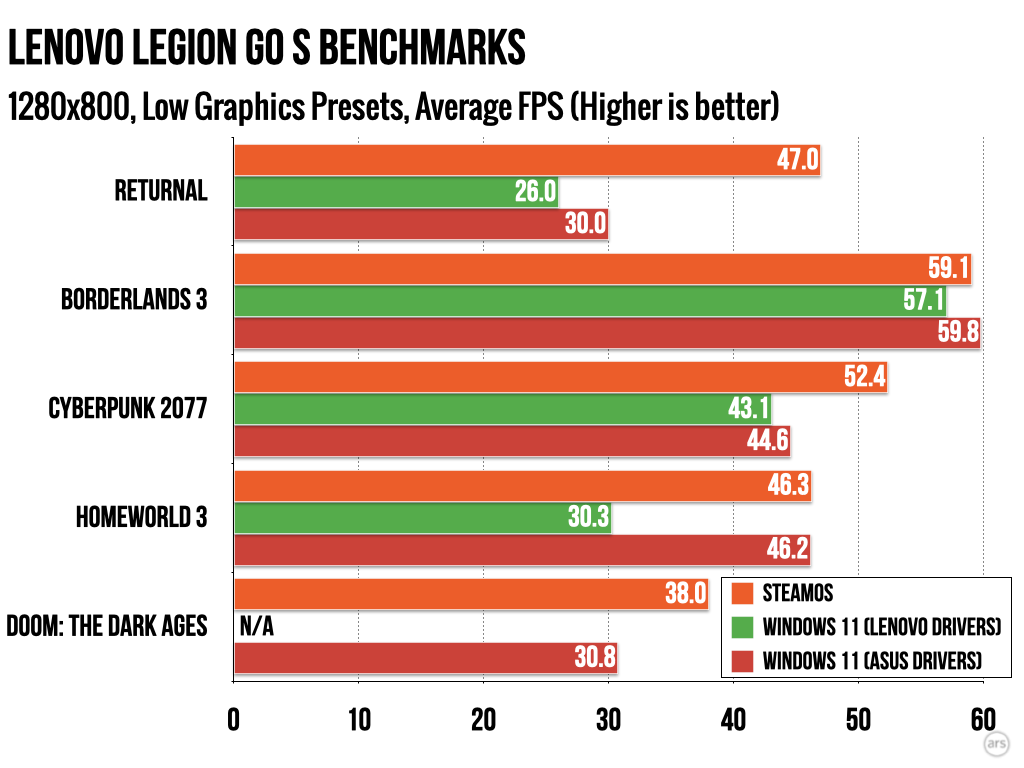This was already covered in a video by Dave2d (Lemmy discussion here), but it’s great to see more widespread coverage of how great performance is for SteamOS vs windows.
Some highlights:


This was already covered in a video by Dave2d (Lemmy discussion here), but it’s great to see more widespread coverage of how great performance is for SteamOS vs windows.
Some highlights:


A shame that many multiplayer game developers, like EA and Riot, still consider Linux to be too unsafe to trust with an anti-cheat. I wonder if Valve is working on a proper solution for that - signed kernels and packages a la MacOS, perhaps?
Linux is too secure to trust with their rootkits.
Kernel anticheat is seriously bad, and shouldn’t be allowed on any computer. Kernel anticheat is basically installing full access backdoors to your computer that you have no control over. Attackers and malicious devs have used kernel anticheat to install ransomware, spyware, crypto miners, and more. They also frequently cause increased system instability and crashes.
Kernel anticheat typically runs from the moment your PC is turned on, and it’s job is literally to spy on you to make sure you’re not cheating. Among other things, many take constant screenshots of your PC to see what you’re running. In this day and age where every company is spying on your and selling your data, installing kernel anticheat is literally sharing 100% of what you do on your PC with a company (usually chinese company) and trusting them to not take advantage of your data.
Furthermore once you’ve installed kernel level anticheat, there’s no way for users to reliably remove it. Most anticheats will reinstall themselves if removed, and it’s basically assumed that once you’ve installed one, your system is permanently compromised. They can create backdoors on the PC to allow reinstalling themselves in the future, or even install other software without your knowledge. There are concerns about them batching your bios, so that even a full harddrive wipe won’t be able to remove their backdoors.
Finally, the whole point of kernel anticheat (to players) is to prevent cheaters, but that doesn’t even work. Games like valorant are filled with cheaters despite using kernel anticheat. It’s just led to a bunch of kernel level cheat software that’s still able to hide from anticheat. So players are giving up their PC security/etc for basically no real gain.
That’s precisely why I haven’t so much as touched any games if they don’t support Linux with their anti-cheat solution. The developers of Apex Legends proudly announcing that dropping support for Linux made cheaters drop “significantly” doesn’t sit well with me, and in fact I suspect EA is doing something malicious that can’t be feasibly detected precisely because of their kernel-level access. And don’t even get me started with Tencent-funded Riot’s Vanguard, it’s practically guaranteed that China will eventually demand to use it as a backdoor someday.
I’m pretty sure it’s mandatory that any Chinese owned company has to have backdoors and provide access to the government. I’ve read interviews where people talked about running companies in China, and they would talk about how government employees would come and install hardware in all their server rooms, and they couldn’t touch any of it or do anything about it.
I don’t think it’s a coincidence that most kernel anti-cheat are developed/used by companies that are at least partially Chinese owned.
Yeah it is suspicious. Would be interesting if someone tried to decompile them to try and see if they hold any secret or malicious functions. I know that many of them have serious security vulnerabilities as is.
Considering that Vanguard has already been bypassed at least once (see dailydarkweb.net/vanguard-bypa… ), I think somebody must already know if the tool is ultimately malicious or not. Problem is, the somebody that knows has a vested interest in not disclosing any details, being a cheat bypasser and all.
I’m not sure if this is true for the ones backed by the larger companies, like EAC. It’s possible to completely remove EAC using their installer.
In my experience, this is untrue. Valorant isn’t “filled” with cheaters in the same way Apex Legends is.
The anti-cheat programs provide uninstall options, but you’re basically just assuming they actually uninstalled and didn’t leave anything behind. You don’t have any control over whether it actually fully removes itself or not, it’s very difficult to verify that nothing was left behind, and some have been caught leaving software behind or reinstalling themselves silently later.
Apex Legends also has kernel anti-cheat, so my point still stands. Also Apex legends famously had people’s machines get hacked through it’s anti-cheat during a tournament.
Some anti cheat work better than others, and it depends on how much you’d like to play the game that needs it. Plenty of games without.
EAC does not hide its process and you can see it running. If it’s not, perhaps it has left files behind, but that’s a Windows issue more than EAC’s.
The fundamental issue with kernel anticheat is you’re giving full control and unlimited monitoring of your computer to a company, and trusting them to not abuse that access. Being able to see some processes it runs isn’t any kind of guarantee that those processes aren’t doing something undesirable, and doesn’t guarantee that there aren’t other processes doing things secretly.
EAC should be one of the better ones, but it’s still a question of:
If even Microsoft was/is considering giving custom kernel modules the boot and potentially not allowing them in the future (due to similar but unrelated issues) why should the Linux community embrace proprietary kernel modules from companies who’s goal is antithetical to the user, and which are probably horribly insecure and/or rootkits themselves.
I sure hope not. I don’t want gaming on Linux to be turned into something where you need to run steamOS to be able to play certain games or be dependent fully on Valve, instead of any distro you like.
I don’t want to switch Microsoft with Valve. I want my operating system to be completely mine.
I am already annoyed with how certain programs like Geforce Now’s new native linux client is advertised as a SteamOS client and that it only works on a steam deck.
I don’t know if it does only works on a Steam deck but they sure advertise it as such.
Signed Kernels are problematic for some users. While the distribution-supplied kernel binaries are fine for most users, there are always those who want to (or need to, due to hardware quirks or bugs) tinker with the kernel compile-time configuration, or the kernel source code itself…
Lots of other games to play.
Single-player? Absolutely. Multiplayer though? Outside of fighting games, indie games, and anything made by Valve, it’s increasingly difficult to find any multiplayer game that works on Linux, and even those that still work can have the multiplayer yanked off down the line like what happened with Apex Legends.